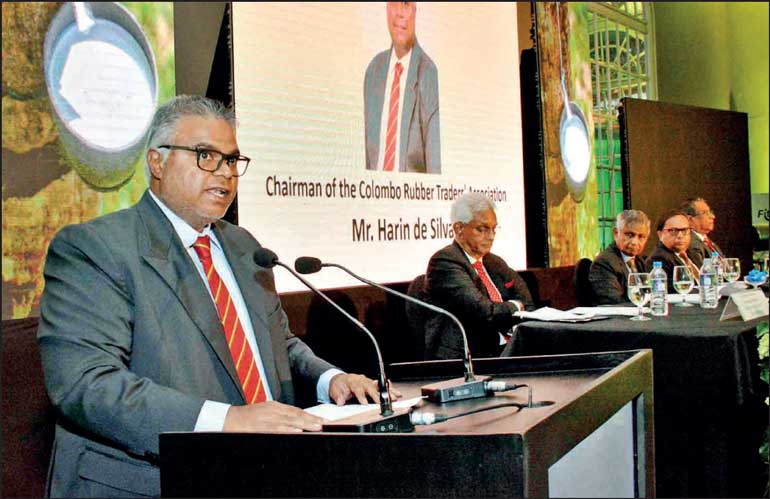Thursday Feb 19, 2026
Thursday Feb 19, 2026
Wednesday, 9 July 2025 00:00 - - {{hitsCtrl.values.hits}}

By Charumini de Silva
The Colombo Rubber Traders’ Association (CRTA) Chairman Harin de Silva said the country’s once proud natural rubber industry is now at a crossroad and teetering on the edge of irrelevance unless urgent, collective action is taken.
Speaking at the 106th Annual General Meeting (AGM), he warned that the country’s rubber sector, despite its global reputation for quality and sustainability, is slowly being eroded from within. “This AGM is not just a checkpoint, it’s a crossroads,” he told the audience. “The world has changed. The climate has changed. Consumer expectations have changed. And the only question left is: can we?”
Elaborating on Sri Lanka’s rubber industry is steeped in legacy, spanning over 160 years, he said that it has produced generations of skilled tappers, brokers, exporters, and manufacturers as well as has helped define the country’s industrial economy.
But that proud history, de Silva stressed, is now at risk of becoming just that history.
“On one hand, we are producing some of the finest, ethically sourced natural rubber in the world. Our manufacturers are globally competitive. But on the other hand, 2024 recorded our lowest ever national rubber output, falling below 70,000 tons,” he opined.
He lamented that thousands of hectares have been lost to real estate development, neglected plantations and poor replanting. ”Sri Lanka’s 65,000 rubber smallholders, who contribute around 70% of national output are struggling to stay afloat,” he said.
“We are operating in a business where our rubber plantations are ageing faster than our ambitions,” he said bluntly.
The solution he suggested was a “Natural Rubber Renaissance” — a multi-year, multi-agency effort focused on replanting high-yield, climate-resilient clones, expanding nursery access for smallholders and creating financial support schemes that carry farmers through the long wait to tapping maturity.
“The CRTA is ready to back such a revival. But we need political will to match the industry’s readiness,” de Silva stressed.
Beyond land and trees, he said the industry faces another invisible but critical threat, which is its diminishing workforce. “Our skilled tappers are mostly over 50. Young people no longer see a future in rubber. This isn’t just a labour shortage. It’s a generational disconnect,” he said.
To reverse this, de Silva argued, the sector must present rubber not as a relic of the past, but as a future-ready, technologically advanced and environmentally essential industry.
He said climate change is also wreaking havoc, with rainfall patterns growing more erratic and droughts more frequent, farmers are losing income from untapped days and in some cases, nearly 100 days a year.
“The Government’s withdrawal of the rain guard subsidy has hit growers hard. But we have not stood still,” he added.
In a major move, de Silva disclosed that the CRTA has secured a $ 14 million grant from the Asian Development Bank (ADB) to support countrywide rain guarding—a measure aimed at stabilising yields and protecting farmer incomes.
Another growing concern is PESTA, a fungal disease already spreading across low and mid-country plantations. “We’ve raised the alarm with Government agencies, but action is painfully slow,” he claimed.
CRTA Chief urged swift, coordinated action between farmers, scientists, and State agencies to contain the threat before it devastates livelihoods and exports.
A looming policy shift in one of Sri Lanka’s most valuable markets, the European Union could either be a lifeline or a major barrier. The EU Deforestation Regulation (EUDR), which takes effect in 2025, mandates that all rubber entering the EU be proven deforestation-free and fully traceable.
CTRA Chairman believes this is a moment of opportunity. “Sri Lanka has nothing to hide. Our plantations were established over a century ago. We are not encroachers, we are stewards of agroforestry,” he said.
But proving that to international buyers requires robust traceability systems, geo-location mapping, and verifiable data. “Many smallholders currently lack access to the digital tools and institutional support needed to comply. We must not allow this regulation to become a barrier. Instead, let’s turn it into a competitive edge,” he added.
He assures that the CRTA is working with stakeholders to position Sri Lanka’s rubber as a premium, ethically sourced material, but called for urgent investments in compliance infrastructure to back that claim.
As urbanisation and climate stress take their toll on traditional rubber-growing districts like Kegalle, Kalutara, and Rathnapura, he said the CRTA is advocating for a bold pivot in expanding cultivation into Intermediate and Dry Zones using drought-tolerant rubber clones and sustainable practices.
“This isn’t just about survival, it’s about strategy. By moving into new regions, we unlock land, create rural jobs and strengthen our environmental credentials.”
He highlighted the role of rubber in reducing soil erosion, acting as a carbon sink, and contributing to long-term ecological balance, especially in areas vulnerable to land degradation.
Despite being one of Sri Lanka’s oldest export sectors, he said the rubber industry still lacks a central strategy or a unified body to lead its development. “We have departments. We have pilot projects. But what we don’t have is momentum,” de Silva said.
To address this, the CRTA is calling for the formation of a Sri Lanka Rubber Industry Council — a single platform bringing together growers, researchers, manufacturers, exporters and policymakers under one vision.
“One table. One plan. One voice,” he said. If we are to compete with Thailand, Malaysia, Vietnam, and West Africa, we must stop pulling in different directions.”
He called on the stakeholders, the Government and the private sector to act swiftly. “Let the next 100 years of Sri Lankan rubber not be a story of decline, but of revival and reinvention. Let’s not watch this moment pass. Let’s rise — not with nostalgia, but with purpose,” de Silva said.